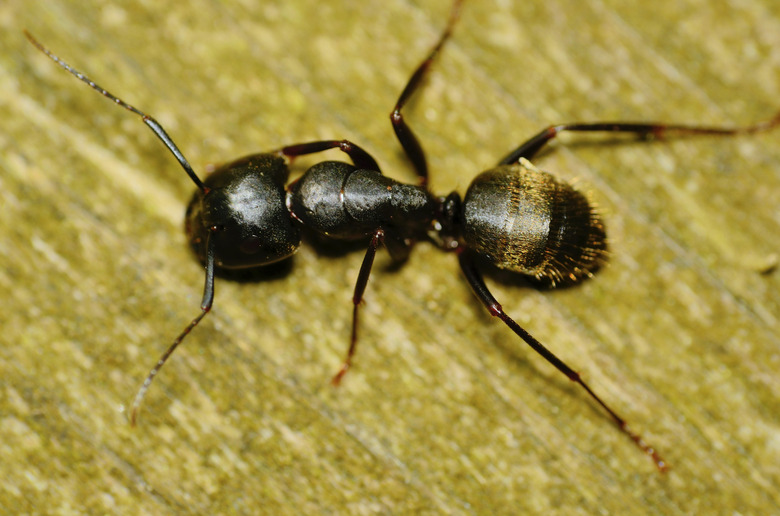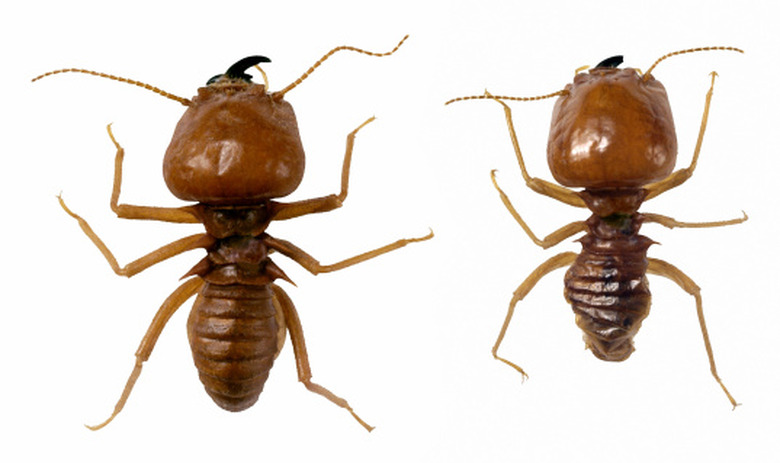How To Identify Indoor Insects By Droppings
Things Needed
- Sheet of white paper
- Few drops of water
If you have visible insect droppings in your home, you may have a pest infestation. Bits of insect feces, or frass, are so small that only a substantial accumulation will usually be noticeable. This indicates that a large number of insects are present. You can identify five common household pests — cockroaches, fleas, bed bugs, carpenter ants and termites — by their frass.
Step 1
Determine where the frass is visible. Different insects have different habits. Roach frass accumulates along bare wooden surfaces, paper and cardboard in rooms that provide a water source, such as kitchens and bathrooms. Flea dirt collects on pet bedding and other areas where the pet rests, and on the pet itself, particularly near the skin of the lower abdomen. Bed bug frass is visible on bed linens. Carpenter ant and termite frass often accumulates in basements, crawlspaces and attics near exposed wooden framing members. It may also be noticed in living spaces if the insects have been chewing through woodwork, flooring and other materials.
Step 2
Note the amount, size and color of the feces. Roach frass looks small black specks, or black pepper flecks. It will be spread out along the roach runway, a frequently-traveled path all the roaches in a colony will use. Flea dirt consists of small, deep maroon or black flecks that are very hard and dry to the touch. Bed bug frass is similar and will appear as small reddish-brown spots that look like rust. Carpenter ant frass looks like sawdust and collects in piles outside the nest. Termites leave six-sided round pellets the size of poppy seeds, often in piles outside of areas where they are tunneling. Their coloring is similar to that of the the wood they have consumed, ranging from gray to various shades of brown.
Step 3
Place a piece of the suspected droppings onto a white piece of paper to identify flea and bed bug frass. Add a drop of water. If it is flea or bed bug feces, the water will turn red because these insects feed exclusively on blood.
Warning
There are hazards associated with each of these insect pests. Roaches can cause respiratory problems and may transmit diseases such as salmonella and hepatitis. Termites and carpenter ants can cause severe structural damage to homes. Fleas and bed bugs leave itchy welts that can become infected, and may also carry diseases.
References
- Purdue University: A Practical Guide to Cockroach Control
- University of Nebraska, Lincoln: Cockroach Control Manual
- Do it Yourself Pest Control: Signs of Termite Infestation
- University of California, Davis: Cockroaches
- University of California, Davis: Fleas
- Bed-Bug.org: Bed Bugs Information
- University of California, Davis: Carpenter Ant and Termite Frass
Cite This Article
MLA
Hunt, Kimm. "How To Identify Indoor Insects By Droppings" sciencing.com, https://www.sciencing.com/how-to-identify-indoor-insects-by-droppings-12555548/. 21 July 2017.
APA
Hunt, Kimm. (2017, July 21). How To Identify Indoor Insects By Droppings. sciencing.com. Retrieved from https://www.sciencing.com/how-to-identify-indoor-insects-by-droppings-12555548/
Chicago
Hunt, Kimm. How To Identify Indoor Insects By Droppings last modified March 24, 2022. https://www.sciencing.com/how-to-identify-indoor-insects-by-droppings-12555548/

